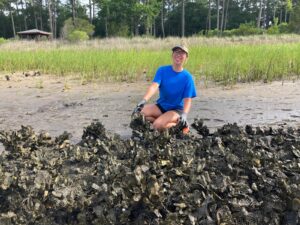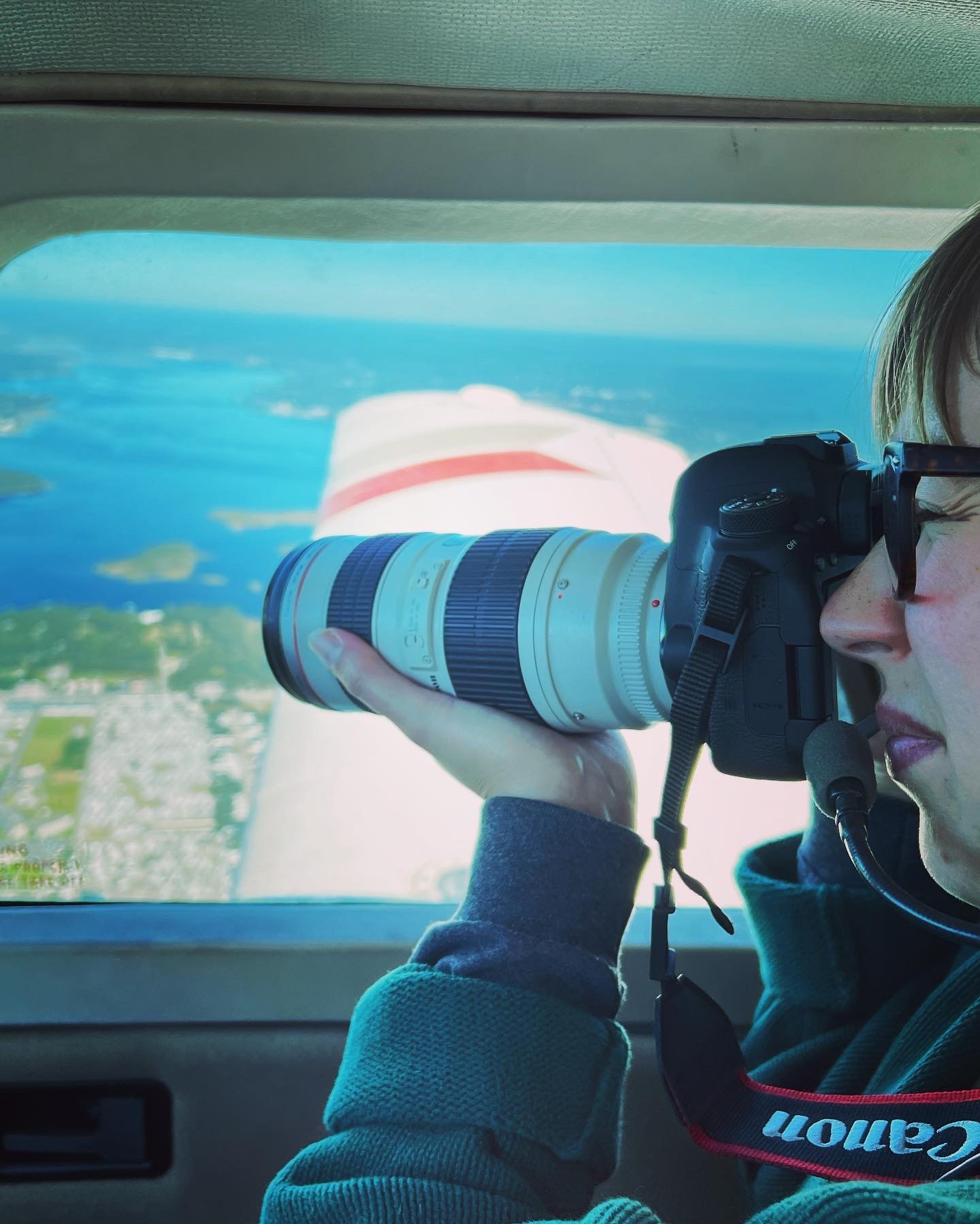The Coastal Carolina Riverwatch Board of Directors has appointed Riley Lewis as White Oak Waterkeeper (WOW). Riley joined the staff of Coastal Carolina Riverwatch in the Summer of 2022. Prior to this role, she served as an AmeriCorps member in Wilmington and engaged the community in citizen science research of wetland and oyster health, conducted educational programming to school age and university students, and provided field experience to environmental educators in local waterways.
Rick Kearney, Board President, added “Riley emerged from a pool of well qualified candidates for Waterkeeper because of her enthusiasm for our mission, her educational background, and her experience. I am delighted that she is on board at CCRW.”
Riley holds a Bachelor of Science in Marine Science from University of South Carolina and a Master of Science in Coastal and Ocean Policy from UNC Wilmington. Her background includes analysis of water quality on drinking water affordability and research of chemical pollutants along North Carolina’s coast.
“I am honored and excited to be your Waterkeeper. Ever since learning about the Waterkeeper organizations I have been inspired by their work. Having grown up on the Chesapeake Bay and lived by rivers my whole life I have a deep appreciation for our waterways and have always been motivated to protect them. North Carolina’s coastal environment is constantly threatened by natural and manmade processes and these threats turn around and harm our communities. Water deserves the respect that we give each other and as Waterkeeper, I will advocate for this belief.” Said Riley Lewis, Waterkeeper.
Lewis will lead several initiatives as Waterkeeper, which will support the mission of CCRW, to protect and enhance the waters, land, and communities of eastern North Carolina.
Concentrated Animal Feeding Operations (CAFOs) subject our rivers to fecal contamination and pollute the air in surrounding communities. Through the “Pure Farms Pure Waters” campaign, we work with other NC Waterkeepers and several amazing statewide advocates to address these impacts. CCRW collects regular water samples in our service area to monitor bacteria levels surrounding CAFOs. We also do aerial monitoring to look for violations. By collecting this data we can track trends on how these facilities are affecting our waters. We can then work with our partners to advocate for the reform of these destructive industries. We have the greatest respect for NC’s local, sustainable farms and are working on initiatives to support these alternatives. In addition to monitoring active CAFOs, CCRW support local and sustainable farms through the #FarmFriday program, a weekly outreach program that features a local sustainable food provider in our watershed. For more information, click here.
Microplastics are another form of pollution plaguing our waterways. Plastics never truly break down. Instead, they breakup into tiny pieces called microplastics. Microplastics can attract toxins and be ingested by aquatic life. Microplastics have become so pervasive that they are present in the human body. CCRW is participating in a two year microplastic study in the New River. We are collecting water and sediment samples to be analyzed for microplastic content. This project is in partnership with all other NC Waterkeepers and will provide valuable information about the scope of NC’s microplastic problem. Riley will also be assisting with the coordination of the NC Marine Debris Symposium this October. Click here for more information.
NC fishing communities depend on clean water as a way of life. They spend more time on the water than perhaps anyone else and are deeply impacted by water quality issues. CCRW’s Water Quality for Fisheries program addresses water quality impacts on NC fisheries. Through a research based survey, we identified five water quality priority concerns from our fishing communities. We developed an Industry Working Group made up of commercial and recreational fishermen to collaboratively address these concerns. Through an assessment process we are evaluating what is currently being done on these issues and working to identify areas of need.
Moving forward, we have several projects we are looking to implement in our watershed. We are hoping to fund research that will lead to local partnerships to develop policies and update infrastructure that will prevent impacts to water quality. We are seeking funding to develop Equity in the Environment programming, expand our Water Quality for Fisheries and Pure Farms Pure Waters programming, and continue to provide water quality monitoring and advocacy services to the Carteret and Onslow county areas.
“The work we do is challenging but rewarding, and we rely on the support from our community, volunteers, and members who consider us as a resource. Our work to support our area and protect our waterways will continue, because even after a big win there will always be more to do.”
– Riley Lewis, White Oak Waterkeeper
Lisa Rider, Coastal Carolina Riverwatch Executive Director, noted, “We are grateful to welcome Riley Lewis to our dedicated team of water quality advocates. Riley has a lot of experience with building community collaborative efforts that protect our community environment. She will be a role model for others wanting to do more to protect water quality in coastal North Carolina. Riley has the perfect combination of knowledge and skills, plus a passion that supports our mission.”
“I have been fortunate to spend time with Riley on several occasions now, and her enthusiasm and passion for our work is inspiring. I cannot wait to work out in the field with her, and I look forward to many more opportunities to share our passion for clean water and our coast!”
– Board Vice President, Katie Tomberlin
“Being a Waterkeeper means, not only, long hours in front of a computer working to fund projects and corresponding with concerned community members and decision makers, but it can be a dirty job too. Fieldwork does involve trudging through some of our most remote and primitive conditions. This is not a job for the faint of heart and we are lucky to have passionate team members that work tirelessly to protect our quality of water and quality of life.”
– Bob Marsh, Board Director

